March 2025
The global PACS and RIS market size is calculated at USD 2.45 billion in 2025 and is forecasted to reach around USD 4.62 billion by 2034, accelerating at a CAGR of 7.27% from 2025 to 2034. The North America PACS and RIS market size surpassed USD 0.85 billion in 2024 and is expanding at a CAGR of 7.36% during the forecast period. The market sizing and forecasts are revenue-based (USD Million/Billion), with 2024 as the base year
The global PACS and RIS market size was accounted for USD 2.29 billion in 2024 and is anticipated to reach around USD 4.62 billion by 2034, growing at a CAGR of 7.27% from 2025 to 2034.
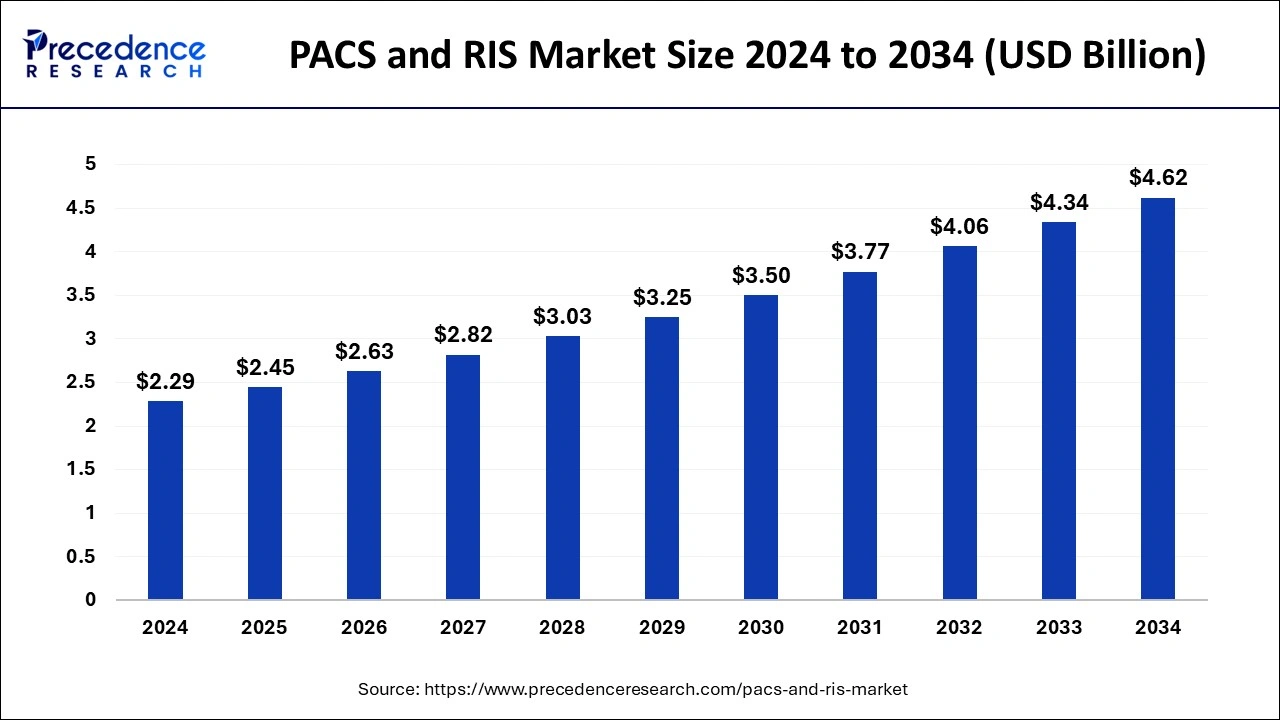
RIS (Radiology Information System) and PACS (Picture Archiving and Communication System) serve different roles in medical imaging. AI integration in RIS and PACS systems has the potential to maximize the radiologists’ capability by creating a more efficient and accurate radiology workflow. Leveraging AI in PACS and RIS offers several benefits, such as early and accurate diagnosis, seamless radiology workflow, reducing the manual data entry burden on radiologists, and ultimately delivering better patient care. With AI integration, RIS can streamline administrative tasks by automating data entry and improving patient care. In contrast, AI-powered PACS systems can speed up interpretation, enhance image analysis, and improve diagnostic accuracy. Integrating AI into PACS has the potential to revolutionize medical imaging. The integration of AI into PACS alleviates physician burnout, improves diagnostic precision, and enhances workflow efficiency in medical imaging. AI-powered PACS systems facilitate more accurate pictures, which are vital for treating numerous conditions.
Radiology and cardiology are the primary users of PACS, but now other fields, such as neurology, dermatology, and pathology, have also begun to adopt imaging technologies. Artificial intelligence (AI) integration in RIS holds great potential for revolutionizing radiology practice and has paved the way for the future of radiology technology. Integrating AI with RIS offers several benefits in radiology. By utilizing AI algorithms, RIS can automate numerous tasks, including image analysis, report generation, and streamlining the radiology workflow. In radiology, AI can analyze medical images, such as CT scans, X-rays, and MRIs, to detect abnormalities or other potential health issues. This speeds up the diagnostic process as well as enhances accuracy, reducing the chances of human error.
The U.S. PACS and RIS market size was evaluated at USD 590 million in 2024 and is predicted to be worth around USD 1220 million by 2034, rising at a CAGR of 7.53% from 2025 to 2034.
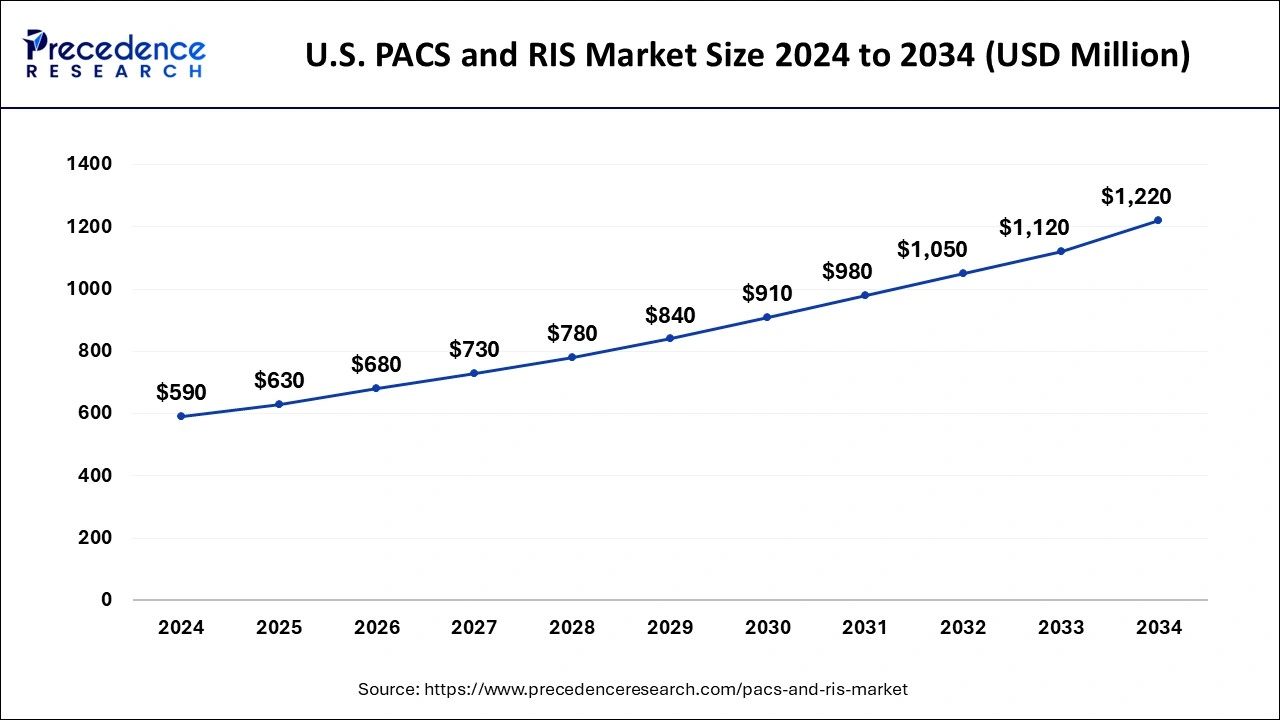
Based on region, North America dominated the global PACS and RIS market with the largest share of 37% in 2024. This is mainly due to the increased demand and adoption of advanced imaging technologies in the healthcare sector. Well-established IT and telecommunication infrastructure and the availability of advanced healthcare infrastructure facilitate the adoption of the PACS and RIS among the healthcare units. Moreover, the increased per capita healthcare expenditure further bolstered the market's growth in the region. According to the National Health Expenditure Account (NHEA), U.S. healthcare spending grew 7.5% in 2023, reaching USD 4.9 trillion or USD 14,570 per person.
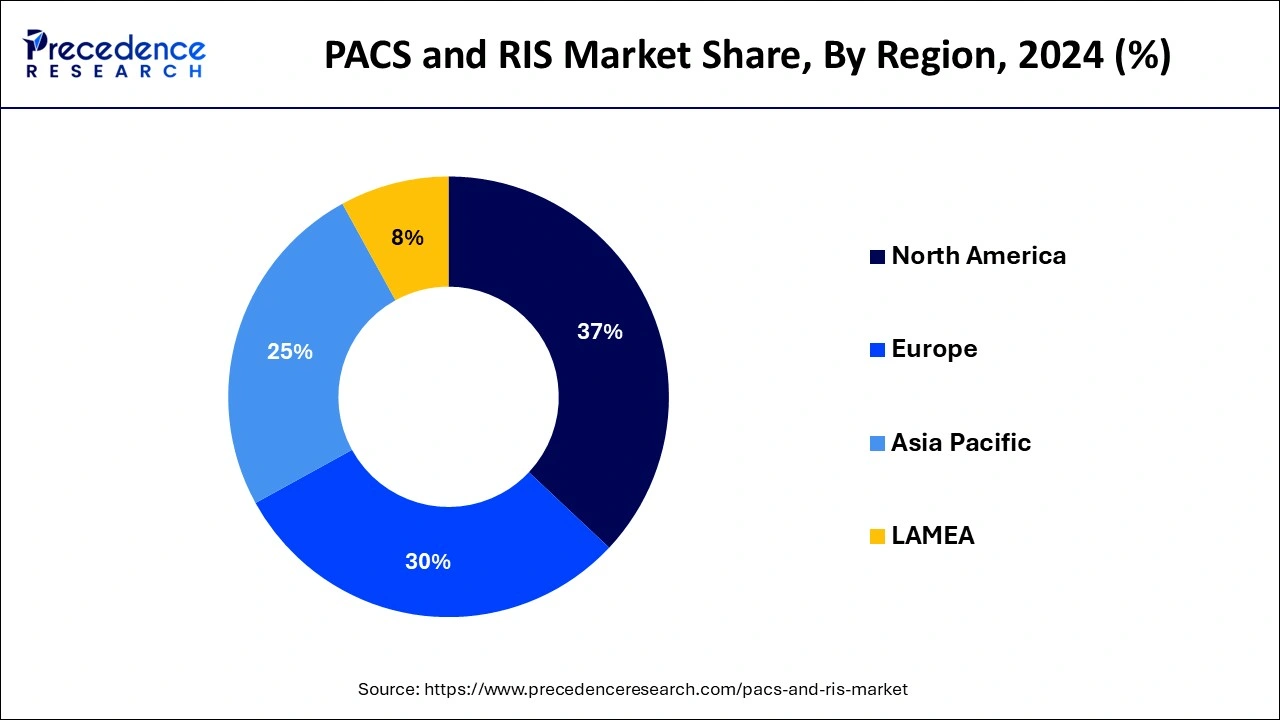
On the other hand, Asia Pacific is estimated to be the most opportunistic market during the forecast period. The rising government investments on the development of sophisticated healthcare infrastructure in the region coupled with the rising penetration of numerous private clinics and diagnostic centers is expected to augment the demand for the PACS and RIS in Asia Pacific during the forecast period.
Asia Pacific
In January 2023, Manipal Hospitals, one of India’s foremost healthcare providers entered into an agreement with FUJIFILM India, a pioneer in healthcare technology, to leverage the latter’s innovative digital technology for storing sensitive medical documents and images. Under the long-term agreement, Manipal Hospitals would be provided with a large-scale Picture Archiving and Communication System (PACS), powered by FUJIFILM India. The PACS eliminates the need for manually storing, retrieving, and sending sensitive information, films, and reports. The deployment will cover 23 hospitals and 45 Teleradiology facilities under the umbrella of Manipal Health Enterprises across the country.
| Report Coverage | Details |
| Market Size in 2025 | USD 2.45 Billion |
| Market Size by 2034 | USD 4.62 Billion |
| Growth Rate From 2025 to 2034 | CAGR of 7.27% |
| Largest Market | North America |
| Base Year | 2024 |
| Forecast Period | 2025 to 2034 |
| Segments Covered | Product, End User, Component, Region |
| Regions Covered | North America, Europe, Asia-Pacific, Latin America, and Middle East & Africa |
Rising Investments in Automation
The rising investments in automation and digitalization of the healthcare sector are the primary drivers of the global PACS and RIS market. With the increased adoption of digital imaging, such as X-rays, MRI, ultrasound, and digital pathology, there is a high demand for picture archiving and communication systems (PACS), which provide convenient access and low-cost storage solutions for digital images. PACS offers economical access to various source modalities like computed tomography, positron emission tomography, and X-ray plain film. The advantages of PACS, like timesaving and digitalization over traditional image storage, display, and distribution, are significant factors that have boosted the demand for PACS across the healthcare industry.
The PACS has wide applications in diagnostic centers, clinics, and hospitals as it offers convenient digital image storage by eliminating the storage purposes of hard copies. A significant rise in diagnostic procedures further contributes to market expansion. In 2023 alone, approximately 3.6 billion medical imaging diagnostic procedures were performed globally. This volume is expected to grow significantly, with projections estimating that global imaging procedures will surpass 5 billion annually by 2030. The increased government and corporate investments in digitalizing healthcare units for cost reduction and increasing profits are expected to further drive the market's growth during the forecast period.
High Cost
The high cost of PACS and RIS is a key factor hampering the market's growth. Integrating PACS and RIS with existing healthcare IT systems can be challenging and require substantial investments, discouraging small healthcare organizations from implementing PACS and RIS. In addition, data security concerns limit their adoption, thus hindering market’s growth.
The growing adoption of cloud-based PACS and RIS creates immense opportunities for key players operating in the market. Thus, market players are focusing on developing new cloud-based PACS and RIS and upgrading existing systems to gain a competitive edge. For instance, In March 2024, RamSoft, a global leader in novel cloud-based RIS/PACS radiology solutions for imaging centers and teleradiology providers, launched Progressive Loading. This unique feature of OmegaAI, RamSoft’s cloud-native radiological software built on Microsoft Azure, allows a radiologist to quickly load a large imaging study via a web browser. In addition, the increasing demand for advanced diagnostic tools propels the growth of the market.
The PACS segment accounted for the highest market share of 83% in 2024. This is basically due to the extensive usage of cardiology PACS, orthopedic PACS, dental PACS, and oncology PACS across the globe. The rising cases of cancer among the population has significantly boosted the usage of oncology PACS. According to the International Agency for Research on Cancer, in 2020, around 19.3 million new cancer cases and 10 million cancer deaths were reported across the globe. The global cancer cases are estimated to grow by 47% from 2020 to 2040. It is expected that 28.4 million cases will be recorded in 2040, globally. Hence, the rising cases of cancer will help to sustain the dominant position of this segment throughout the forecast period.
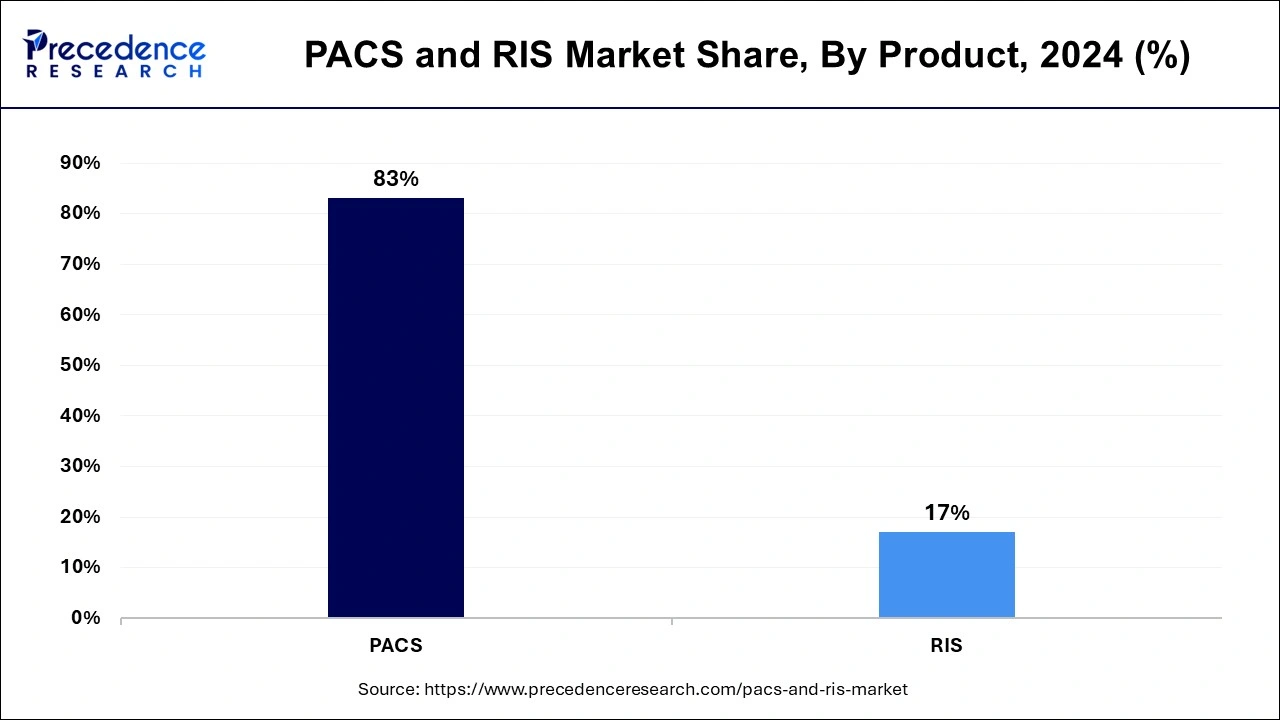
On the other hand, the RIS is estimated to be the most opportunistic segment during the forecast period. The rising number of patients in the hospitals and other healthcare units is rising owing to the rising prevalence of various chronic diseases and growing geriatric population across the globe. The need for reducing paperwork and demand for digitalization of the healthcare systems is boosting the growth of the RIS segment.
The services segment dominated the market in 2024, in terms of revenue and is estimated to sustain its dominance during the forecast period. This is simply due to the lack of proper knowledge about handling the digital systems of the PACS and RIS amongst the healthcare professionals. Therefore, the third-party services are adopted for the efficient utilization of healthcare information services like PACS and RIS while achieving cost efficiency.
On the other hand, the software is estimated to be the most opportunistic segment during the forecast period. This is attributed to the increasing need to reduce the healthcare costs and improve the data management systems. Further, the increasing adoption of healthcare information systems like RIS and PACS is increasing the demand for the healthcare information software.
The hospitals segment dominated the global PACS and RIS market in 2024, in terms of revenue. This can be attributed to the enhanced financial, clinical, and administrative services that are offered by the latest PACS and RIS healthcare information systems. The increased number of hospital admissions which results in the generation of huge digital diagnostics results that needs to be efficiently managed. The rising number of private hospitals across the globe is expected to further drive the growth of this segment during the forecast period.
The diagnostic centers segment is expected to be the fastest-growing segment during the forecast period. This is attributed to the rising demand for the diagnostic services owing to the rising prevalence of chronic diseases among the global population. Further, the growing demand for the automation and integration of healthcare information for efficient patient care, and rising adoption of the PACS and RIS across the globe is expected to foster the growth of this segment.
The market is moderately fragmented with the presence of several local companies. These market players are striving to gain higher market share by adopting strategies, such as investments, partnerships, and acquisitions & mergers. Companies are also spending on the development of improved products. Moreover, they are also focusing on maintaining competitive pricing.
The various developmental strategies like collaborations, acquisition, partnerships, mergers, and government policies fosters market growth and offers lucrative growth opportunities to the market players.
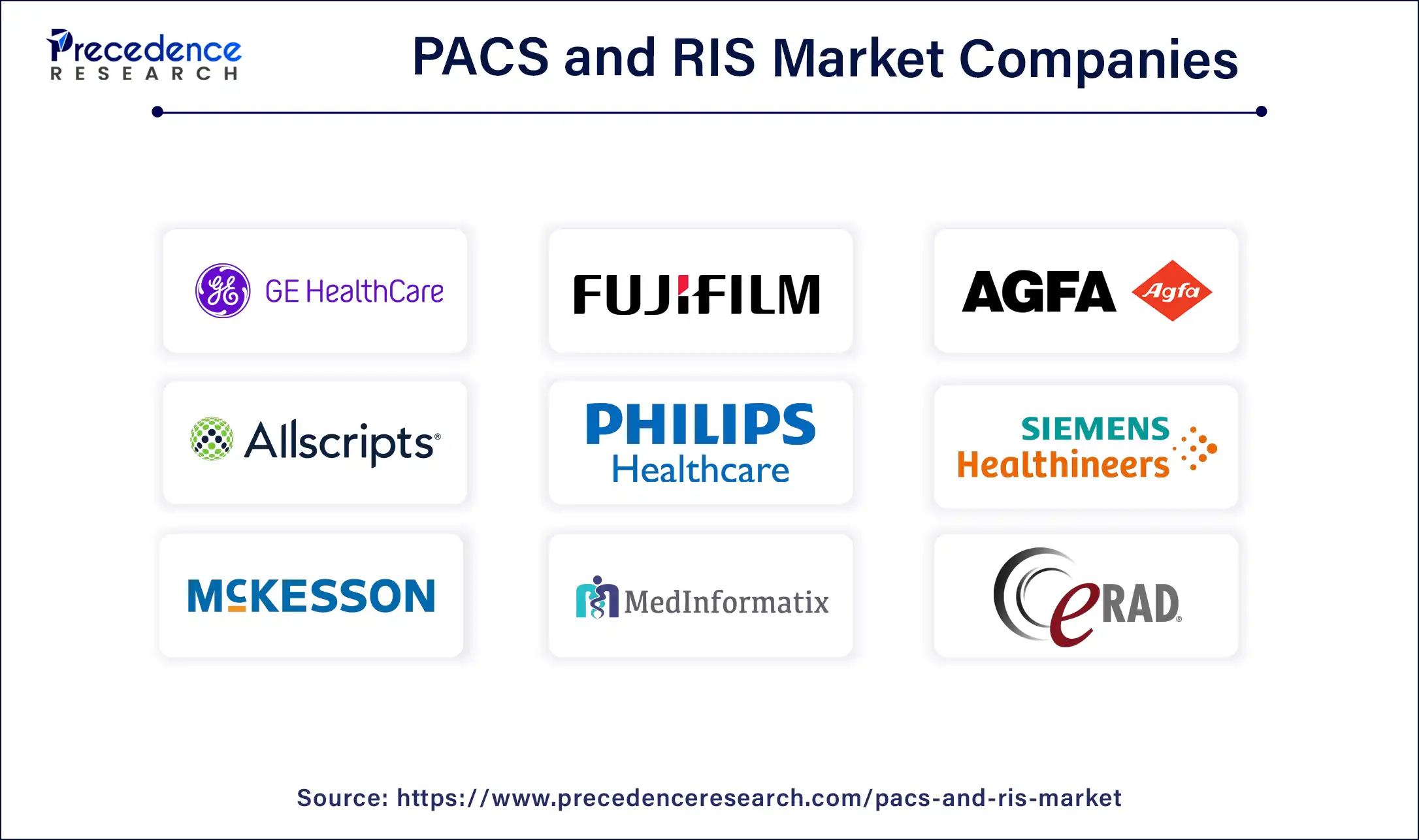
By Product
By Component
By End User
By Geography
For inquiries regarding discounts, bulk purchases, or customization requests, please contact us at sales@precedenceresearch.com
No cookie-cutter, only authentic analysis – take the 1st step to become a Precedence Research client
March 2025